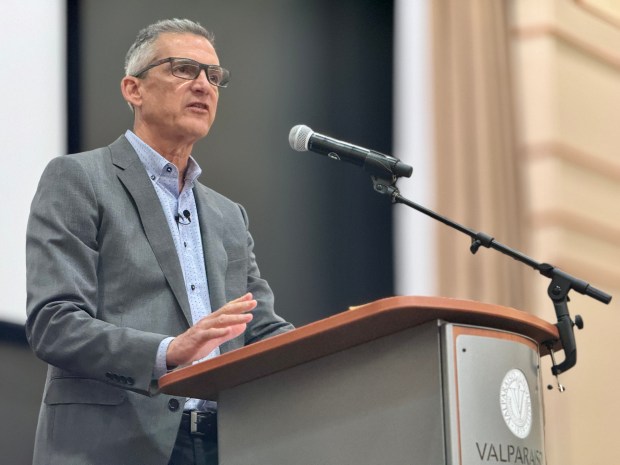Sheriff’s officers and their supporters packed the Lake County Council chambers Tuesday to overflow capacity carrying signs reading “Pay the County Police” and “Union Strong” in an effort to move the needle in their favor on contract negotiations.
The Lake County Council’s negotiating team and the team representing the officers have been in talks for 10 months on a new police contract. The council’s negotiating team has been mum on the details of the negotiations publicly, only breaking its silence Tuesday, after saying negotiators on the police side broke the agreement last to keep negotiations behind closed doors week.
Sticking points have been identified as salary, overtime, pension buyouts and time off calculations.
Council President Christine Cid, D-East Chicago, who is part of the three-member council negotiating team that also includes Councilman Randy Niemeyer, R-Cedar Lake, and the late Councilman Clorious Lay, D-Gary, who has not yet been replaced on the team, read from a prepared statement at the close of the meeting. The contract was not up for consideration on the regular council agenda.
“When the process began 10 months ago, the Lake County Sheriff’s Department came to the negotiating table with an initial request of a 28% pay raise over three years,” Cid said.
“In collaboration with the Sheriff’s Department Association, we began evaluating all the various pieces of the compensation package to see if it was possible to meet the 28% request,” Cid continued, adding the council team realized it could not fund that increase without making impactful changes to the structure of the department.
A contentious negotiation process has continued with a federal mediator brought in in March at the police association’s request. Cid said they were surprised by the request because the team had thought a deal was near.
Since that time, any proposed changes to the department’s overtime have been taken off the table.
The back and forth prompted Sheriff Oscar Martinez to say while he may disagree with the council’s numbers, “we are this close in getting the contract signed.” Martinez told the council the latest pay increase offer of 5% in 2024, 4% in 2025 and 4% in 2026 is agreeable and the remaining hitching point is how vacation and sick day time is calculated.
Martinez said officers who work a 12-hour shift should get the equivalent 12 hours of pay when using a vacation or sick day.
Cid and Niemeyer disagreed, saying the pay scheme is unfair. For payroll purposes a full holiday, vacation or sick day is eight hours, regardless of how many hours in a day an individual may work.
“That’s not fair compensation,” Cid said.
Martinez said he has a solution to pay the estimated $75,000 a year it costs to pay officers for their usual work day shifts on vacation and sick days from a non-reverting, fee-based fund so it will have no impact on taxpayers. Martinez said the department can also cover the final sticking point — pension buyouts.
Officers who retire after 20 years have the option of taking their pension in perpetuity or as a lump sum payment. Some officers elect for the lump sum payment.
Councilman Pete Lindenmulder, R-Schererville, said the council wants to increase the pay for police but as the county’s fiscal body, it has limitations.
“It’s not like we can go to the state and ask for more money. There are only so many dollars we can allocate,” Lindenmulder said.
Niemeyer said the county has to weigh any salary or benefit increase with the impact on taxpayers.
“Our primary responsibility is to act in the best interests of the entire community, balancing the needs of law enforcement with fiscal responsibility. We believe that by working together collaboratively, we can achieve our shared goal of providing fair and competitive compensation to the officers who risk their lives every day to keep Lake County safe,” Niemeyer said in a statement.
Councilman Ted Bilski, D-Hobart, said that since it appears the sides were able to come to terms on much of the terms, and with the sheriff’s latest agreement to cover the cost of the hours and pension buyout, the sides should get together as soon as possible without the attorneys to iron out a final deal.
Police representatives claim that the county’s officers are among the lowest paid in Lake County. But, based on documents compiled by the county council and based on compensation data available through the Indiana Gateway, the Lake County Sheriff’s Department officers rake in the third highest average pay of the various police departments in the county.
The highest average salaries can be found in East Chicago and St. John, where police earn an average salary of $88,000. County officers earn on average about $79,000 a year. Cedar Lake, Crown Point, Dyer, Gary, Hobart, Lake Station and Whiting officers all have an average salary of below $74,000 a year.
The Gateway salaries include base bay, lateral pay and overtime pay and are not representative of starting salaries within the various Lake County Departments.
Before the meeting, Dave Murchek, president of Local 72 and part of the negotiating team, said the county and union have been in talks for over a year and entered into mediation with a federal mediator on March 19. Murchek said they worked with the mediator to create a deal, the council took it for review and came back with a regressive offer.
“We want a fair raise without having to lose benefits,” Murchek said.
Joe Hardimon, treasurer of the Fraternal Order of Police, said the departments’ pay already lags behind others in the region. The department is finding it difficult to entice new officers to join the force and retain those already there.
Murchek said multiple department members have applications out with other law enforcement agencies. The pair said turnout for police recruiting events is the lowest it has ever been.
At one time, more than 300 people would come to the government center to physically receive an application for the annual hiring, Hardimon. Now, applications are online and more easy to obtain, yet a total of only 300 people have applied for a spot over the past three years compared to 300 each hiring session, he said.
“The climate for policing has changed dramatically. It’s not as prestigious as it used to be. We need to do all we can to entire new hires and keep good officers,” Hardimon said.
“This is not about politics it’s about paychecks,” Murchek said.




